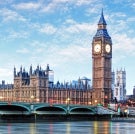Labour accuse Tories of alienating business with Trump-like ‘conspiracy theories’
Conservative cabinet ministers spouting Trump-like conspiracy theories are alienating business, the shadow business secretary Jonathan Reynolds has said.
The Labour frontbencher said Britain needed the “best of government” to tackle the big issues of the day, including poor economic growth and climate change. But businesses were “getting worried” that some senior Tory figures are following a populist path of the kind ploughed with Donald Trump in the US, he claims.
In an interview with The Independent, Mr Reynolds also said that business wanted an early election, to give them stability after the turmoil of recent years.
He predicted “dozens” of companies would come out to publicly support Labour before voters go to the polls. And he denied they were moving to his party simply because Labour is trouncing the Tories in the polls.
Appealing to businesses was a key aim of Keir Starmer’s leadership. Captains of industry had been alienated by the Corbyn years. His brand of left-wing politics saw some hug the Tories even more tightly than in the past. Corbyn’s shadow chancellor John McDonnell did embark on a ‘tea offensive’ – in which he tried to woo business over cups of hot beverages. But one CEO of a water company described it at the time as ‘less tea, just offensive’.
New shadow chancellor Rachel Reeves has been credited with turning the party’s reputation around, although Mr Reynolds is seen as central to that as well. The 43-year-old is seen as well-liked and across his brief.
On the current Conservative party, he argues: “Some of the stuff that we saw last week at Conservative conference – the conspiracy theories, the outright lies, the broken promises on infrastructure, the whole tone of how they’re talking about the country. It’s not what businesses want.”
Pressed on which “conspiracy theories” he was talking about, he said: “Mark Harper, a mainstream, sensible, Conservative politician in the cabinet, saying the 15 Minute cities stuff. Which is a pure internet conspiracy theory. I think the ridiculous presentation of a ‘meat tax’ or ‘seven bins’ or compulsory car sharing, no-one was planning for these things.”
At the conference, Transport Secretary Mark Harper was he said he was “calling time on the misuse of so-called ’15-minute cities'”. Conspiracy theories have erupted amid claims there are sinister plots to keep people in their local areas.
His cabinet colleague Claire Coutinho also came under fire when she claimed that Labour was “relaxed about taxing meat”, when no such policy exists.
Mr Reynolds said: “This was coming from cabinet ministers in the main. A lot of businesses are looking across to maybe the sort of Trump direction in the Republican Party in the US and they’re getting worried, quite rightly, that increasingly that is the kind of evidence, that populist direction… that seems to be the direction the Conservative party’s going.”
Businesses want “stability … (and) serious policy.” he said. “They don’t want cabinet ministers reciting internet fringe theories”.
Labour’s Jonathan Reynolds is the party’s shadow business secretary (Jane Barlow/PA)
He also claimed that in pursuit of stability, and a year after Liz Truss’s disastrous mini-Budget “businesses want an election”.
He will use his conference speech on Tuesday to claim that Labour is the “undisputed” party of business. But with the polls showing Labour far ahead of the Tories, were they just following the way the wind is blowing? “I would disagree with that,” he said. Labour sources say they have been inundated with interest from business at this year’s conference in Liverpool.
Mr Reynolds predicted that many dozens would come out in support of his party before polling day. “More than dozens”, he said.
Downing Street declined to comment.
Sources close to Mr Harper said he later told Times Radio the 15 minute conspiracy theory itself was “clearly nonsense” but that his speech was referring to specific examples, including one council limiting how many times motorists could drive down a certain street.
This article has been archived for your research. The original version from The Independent can be found here.



